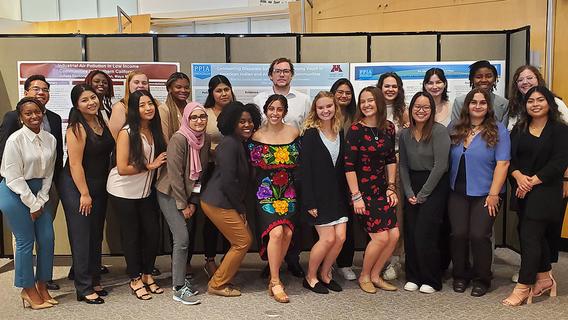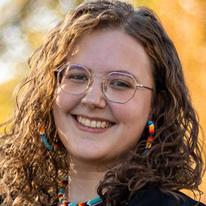
A group of talented college students successfully concluded a rigorous Junior Summer Institute (JSI) training program late last month, hosted by the Humphrey School of Public Affairs.
Described as a “test drive” for graduate work in public policy, the JSI program is designed to prepare rising seniors—mostly from underrepresented communities—to enter and succeed in master’s degree programs and launch careers in public service.
In line with its firm commitment to increasing diversity in the field of public policy, the Humphrey School welcomed 23 JSI fellows from various states and backgrounds who immersed themselves in public affairs for seven weeks.
They took courses in policy analysis and statistics, received help preparing to apply to graduate school, and met with policy leaders from diverse backgrounds. The fellows visited different Minnesota businesses and organizations and saw first-hand that a career in public service can take many different forms.
Public policy research
In addition, the students worked in teams to research challenging public policy issues such as combating sex trafficking of Indigenous women; reducing air pollution in low-income communities; and ending mandatory jail time for drug offenses, and to analyze potential solutions.
The groups presented their findings at a poster showcase on the last day of the program, and instructors were impressed with the sophistication of their work.
One team researched suicide rates among young people, examining why youth in American Indian and Alaskan Native communities are more at risk for suicide than those in other groups. One reason for this trend, they concluded, is that Native communities have been discouraged from practicing their culture for decades. Another is the “chronic underfunding” of programs meant to address health care issues in these communities.
The team recommended increased funding for mental health and addiction programs that serve American Indian and Alaska Native populations, and for community-based programs to promote stronger cultural connections.

One member of this team was Rachel Overstreet, a senior studying political science and philosophy at the University of South Dakota, who is deeply involved in tribal issues on campus and off.
Overstreet, an enrolled member of the Choctaw Nation of Oklahoma, is president of USD's Tiospaye Student Council, the representative organization for Native American students at the University; and previously served as an advocate for the Friends Committee on National Legislation, which is lobbying Congress to establish a federal truth and reconciliation commission on the Indian boarding school era.
Overstreet told USD the JSI gave her an “amazing” opportunity to learn with other young people from around the country who are interested in public policy, and to get a leg up on reaching her career goal—to work in the arena of federal/state/tribal policy.
“I’m hoping to apply to a graduate program next year in public policy or a related field,” she said. “The JSI will help prepare me for the graduate school application process.”
Collaboration and connections
The emphasis on teamwork and collaboration is another valuable step in preparing for grad school.
“The JSI program lives the Humphrey School mission of equipping leaders to advance the common good in our diverse world,” said Michael Massad, the School’s director of admissions. “This is a great opportunity to prepare the next generation of policy leaders, and I’m happy the Humphrey School is a part of that.”
Along with their coursework, the fellows had many opportunities to explore the Twin Cities metro area, visiting notable landmarks like the State Capitol, the Science Museum of Minnesota, art museums, and other sights, and toured the city of Minneapolis by bike.
In addition to academic and cultural experiences, the JSI program emphasizes networking, and many fellows develop lasting connections with each other. Alumni like Ruby DeBellis, a recent graduate of the Humphrey School, keep in touch with members of their cohort, and connect to an expansive network of JSI alumni across the country,
“The JSI cohort, which includes students from different states and backgrounds, is a microcosm of our country,” said Massad. “This generation will inherit a lot of challenges that need to be addressed. It’s important for them to learn to work with people with different life experiences, and to be exposed to different ideas and perspectives.”
The Humphrey School's ongoing sponsorship of JSI is a demonstration of its commitment to promoting diversity in graduate studies in public policy, international affairs, and public service at the University of Minnesota and nationwide.
The JSI is offered through the Public Policy and International Affairs (PPIA) Program, a national nonprofit that supports a variety of efforts to increase diversity in graduate studies in public policy, international affairs, and public service.
The University of Minnesota is one of six universities across the country to host a JSI. The others are Carnegie Mellon University, Princeton University, the University of Michigan, the University of Washington, and the University of California, Berkeley.

